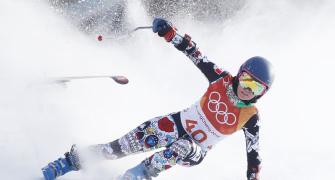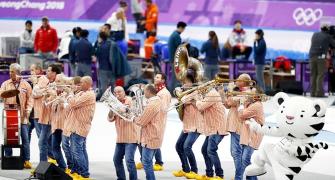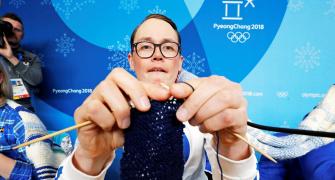South Korea's 'Iron Man' wins first Asian sliding gold
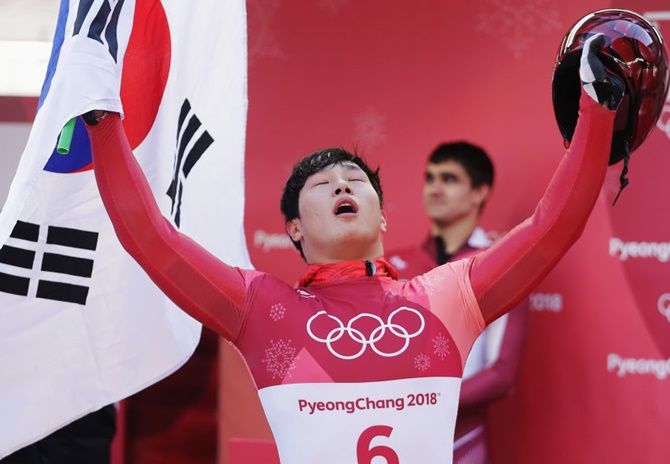
South Korea's 'Iron Man', Yun Sung-bin rocketed to the men's skeleton gold on Friday and become the first athlete outside Europe or North America to win an Olympic sliding medal after dominating the event at the Pyeongchang Games.
Yun, who won the hosts' second gold of the Games, finished 1.63 seconds ahead of Nikita Tregubov, an Olympic Athlete from Russia, while Briton Dom Parsons took bronze after five-time world champion and Olympic silver medallist Martins Dukurs of Latvia made mistakes in his final run.
Parsons' bronze was the first skeleton medal for a British male since 1948. British women, however, have been an ever constant on the podium since the sport was re-introduced to the Winter Olympics programme in 2002.
The 23-year-old Yun was the most consistent performer throughout the competition and headed into the decisive fourth and final run with a lead of more than a second.
With only a potential disaster to stop him from securing gold, 'Iron Man' again delivered the fastest run down the ice to seal his victory.
"He has always been incredible and outstanding, he's a hidden gem and people are starting to recognise his value," said Kim Joon-ho, a childhood friend of Yun's.
Yun, who races in an Iron Man-style helmet and red racing suit, has emerged as a Winter Olympics super hero for the host country, with excited crowds flocking to watch him compete.
Yun thundered over the finish line at over 125 kilometres per hour in front of a euphoric home crowd where he took off his helmet and gave a deep bow on his hands and knees.
"I texted him last night and told him not to feel too much pressure," Yun's friend Kim added, holding a banner saying "Sung-bin! We're here. Let's get the gold!".
"He said he'll do as usual," said Kim.
Mayer's gold to go side-by-side with dad's silver
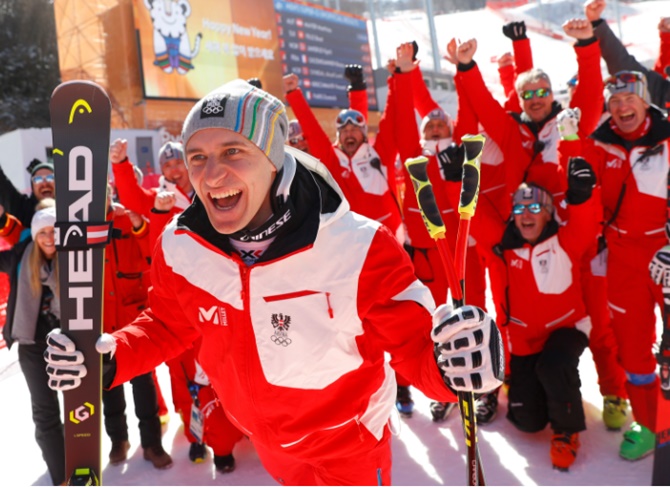
Thirty years after his father won a silver medal in the Olympic super-G, Matthias Mayer went one better on Friday with a surprise win in the same event - days after hurting his hip and two years after suffering a broken back.
As in Sochi four years ago, where he upset pre-race favourites to win the men's downhill, the Austrian entered the race as an outsider against a crack field including in-form Norwegians Aksel Lund Svindal and Kjetil Jansrud.
His victory by 0.13 seconds over Beat Feuz of Switzerland means the Mayer family now has a better record than most countries in men's Olympic super-G - an event that's only ever been won by Norway, Austria, France or Germany.
Mayer joked he could put his medal together with the silver his father Helmut won in Calgary in 1988.
"I saw his Olympic silver medal my whole lifetime, it was in our living room," he told reporters. "I'm happy to have my own now... Yes, maybe he can have mine too."
Mayer, 27, has a knack of delivering on the Olympic stage, but he has endured bleak moments too.
In December 2015 he suffered a vertebral fracture after crashing horribly during a downhill race in Val Gardena, Italy, and underwent surgery that kept him out of action till the next season.
He showed indifferent form in the run-up to the Games, ranking only sixth in super-G on the World Cup circuit. And his Pyeongchang Olympics started badly, with a wipeout in the slalom leg of the Alpine combined, and a disappointing ninth place in the attempted defence of his downhill crown on Thursday.
The slalom crash landed him with a sore hip in the run-up to the downhill and super-G.
"I have to thank my physiotherapist... I wasn't thinking about the pain on my hip, I just was focused on my skiing," Mayer said.
As one of the later starters, he had the advantage of watching the early runners attempt the steep, winding course. The first two - Italy's Peter Fill and Switzerland's Mauro Caviezel - both skiied out after making mistakes on turns.
"I was pushing hard from the top to the finish. Of course I made some small mistakes, but nobody knows the course. I had bib number 15 so I could watch five, six racers at the start and that was good for me so I could make my own line."
Even after his back injury, Mayer said: "I was always thinking about coming back, doing this again and trying my best."
Will he come back in four years time for another gold medal shot? "I hope so," he told reporters.


